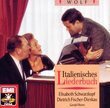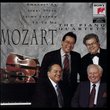| All Artists: Sergey Prokofiev, Yefim Bronfman Title: Prokofiev: Piano Sonatas Nos. 1, 4 & 6 Members Wishing: 0 Total Copies: 0 Label: Sony Original Release Date: 1/1/1994 Re-Release Date: 7/26/1994 Genre: Classical Styles: Forms & Genres, Sonatas, Historical Periods, Modern, 20th, & 21st Century Number of Discs: 1 SwapaCD Credits: 1 UPC: 074645248424 |
Search - Sergey Prokofiev, Yefim Bronfman :: Prokofiev: Piano Sonatas Nos. 1, 4 & 6
 | Sergey Prokofiev, Yefim Bronfman Prokofiev: Piano Sonatas Nos. 1, 4 & 6 Genre: Classical
|
Larger Image |
CD DetailsSimilarly Requested CDs
|
CD ReviewsGreat fun! Eric Brinkmann | Palo Alto, CA United States | 06/30/2000 (5 out of 5 stars) "Prokofiev is probably the only major composer since Beethoven to leave a substantial collection of sonatas for the the piano. These are the three of the more accessible ones. The sixth is by far my favorite of Prokofiev's nine, and Bronfman's performance is spectacular. He has chops to spare, as is obvious from his gleeful romp through the deliriously fast fourth movement. I loved the one-movement first sonata so much I decided to learn it. It is a truly manic piece, without a second of respite, and Bronfman's masterful performance leaves me breathless. It is Prokofiev's opus 1, and is written in a late romantic style reminiscent of Skriabin or Rachmaninov more than the mature Prokofiev. Prokofiev never lost his romantic lyric gift though. Check out the third movement of the sixth sonata if you don't believe me..." Good but there's better hjonkers | The Netherlands | 12/30/2003 (4 out of 5 stars) "These are indeed very fine performances of some Prokofiev sonatas. Bronfman's technique never fails, and he really manages to capture the stunning drive that is so characteristic of Prokofiev's music. But I'm missing one thing: the madness and the illuminating tone that you can hear in Sviatoslav Richter's recordings of Prokofiev, especially his Sixth Sonata. Still, Bronfman holds his stand quite well." A wise option but not the only one! Hiram Gomez Pardo | Valencia, Venezuela | 09/21/2006 (4 out of 5 stars) "Prokoviev' s style and creative output was intimately tied up with his activity as a pianist. As a matter of fact this is the main distinction respect his partnership -Dimitri Shostakovich - who always thought from the perspective orchestral, that' s why his piano music sound so expansive.
But there is still more: Prokoviev smartly, interweaved the classicism vision hovered by a visible irony blended with a musical speech that oscillated between the bitterness and the steeled nostalgia. Of course the marches are present in almost the entire production of Serguei, but we should never forget this genre meant for the Russians their emblematic feature, something like their collective signature, their particular epic. But dislike Tchaikovsky, Rachmaninoff or Rimski Korsakov, Prokoviev does not use the religious element in his works as sustaining basis as the other three composers; Prokoviev lived in one of the most convulsed and troubled historical periods of Russia. The only fact to presence the crumbling of one thousand years of Tsar dynasty and the arouse of a new political system, apart of the overall set of artistic manifestations in total renovation, influenced notoriously his perspectives. With these elements in mind, we must be disposed to appreciate all his important work. The fervent religious ardor was substituted by the cult to personality. The main problem for Prokoviev consisted to express through dissonant passages, all the horror, repulsion, nastiness and rage around his environment and surroundings with the risk of being awaken in the middle of the night in order to be executed. The new generation of pianists simply did not live this period and simply know about through history books, how can you perform the whole bitterness, acidic score with percussive accents that clearly evoke obstinate bells of anguish and impotent desperation before the score that lies in front of you? That' s and no other, underlines the transcendental difference that nestles and beats in the soul of performers who certainly lived and were direct witnesses of that opprobrious times such Sandor, Richter, Gilels, Berman, Ashkenazy or Bronfmann. How to solve this problem in which to make the right approach to express the sound of that music in this double lexicon? Fortunately, Bronfmann still remains as one the most lucid pianists that has known to convey that fatidic struggling and inner tensional state at the moment to perform these pieces. Totally recommended. " |

 Track Listings (8) - Disc #1
Track Listings (8) - Disc #1




